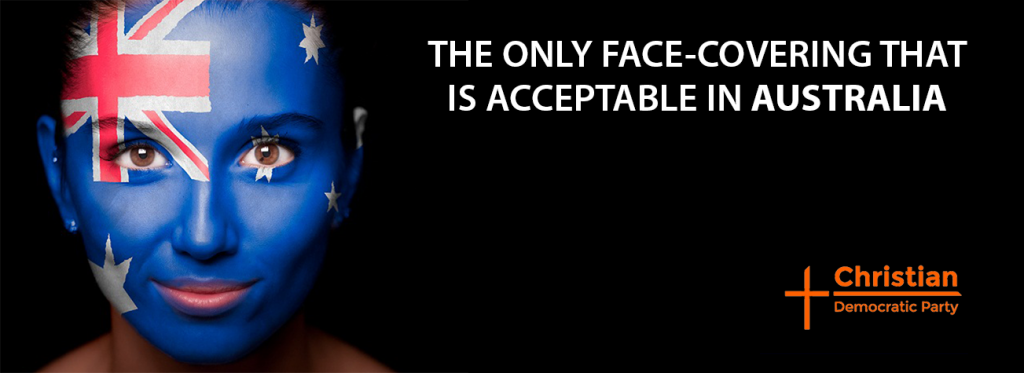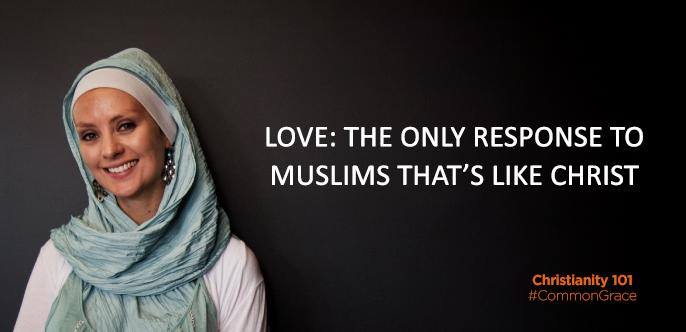The burqa debate just won’t go away. Christian groups are exchanging responses on social media. Eternity spoke to some key Christian leaders, who revealed a wide range of views.
FRED NILE
Fred Nile, the leader of the Christian Democratic Party, and member of the NSW Legislative Council reintroduced his anti face-covering bill in NSW this week and posted an image on Facebook of a young woman whose face is painted with the Australian flag that states “The only face-covering that is acceptable in Australia”.
Nile says the bill he introduced is a ban on face-coverings because “I think in our society it is fair enough that every face should be exposed.” But his Facebook post ignited intense social media debate.

Fred Nile says those who disagree with him are “confused”.
“There is no requirement in the Koran and the Islamic religion for women to wear a face-covering… but only to have a hair-covering, like a scarf, but not to cover their face,” Nile told Eternity.
Nile said he has consulted with Imams in the Islamic community in forming his bill and believes the burqa is largely worn by Australian converts to Islam.
He is asking for a $550 fine for someone wearing a face-covering, though he says the money isn’t important. “It could have been a $10 fine,” he said.
“I am more interesting in the law being educational than prosecutorial… the first thing is to educate Muslims that it is not a requirement of their religion [to wear a face-covering].”
COMMON GRACE
Common Grace, a newly-formed coalition of Christians from various denominations will officially launch later this year. They have chosen to use their first Facebook posting to provide a robust response to the Christian Democratic Party’s Facebook image, posted by Fred Nile.
Activist and WA pastor Jarrod McKenna, part of the new group, told Eternity that while Fred Nile was “of course” his brother in Christ, he believes Nile has “confused a nationalism that is fearful of Muslim Australians, with Christianity.”
“It’s clear that [Fred Nile’s post] speaks of nationalism and a flag above the cross, that speaks of fear of Muslims rather than loving our Muslim neighbours. This is our generous and fun, loving provocation that calls us back to mercy.”

The Common Grace Facebook post shows a friendly looking woman (Susan Carland, the wife of media commentator and Muslim Waleed Aly) wearing a traditional Muslim head-covering, the hijab, with the text “Love: the only response to Muslims that’s like Christ”, Christianity 101 #Common Grace”
Their tagline “more like Jesus, less like jerks” was posted on Facebook the same day as the response to Fred Nile. McKenna says it is not an attack on Christians with views similar to Fred Nile. Rather, it is a call for all Christians to “have a more gracious voice” in the public sphere.
Nile’s post is about face-coverings, while the Common Grace response shows a woman in a hijab (head-covering only). McKenna believes the subtext of comments like Nile’s is “that real Australians are secular Australians, are white Australians,” said McKenna. The general public, he says, aren’t making the distinction between face-coverings and head-coverings. “Women in hijabs (head-coverings) are being spat upon too.”
McKenna believes asking whether the burqa should be banned is like asking whether you should ban Mother Theresa, who also wore a head-covering.
He says Christians need to advocate for the golden rule, “do unto others”.
“I would never want someone to say to me, Jarrod, you can’t wear that cross. It’s a legitimate expression of my faith, and I hope I’ll always be able to wear it. So, if I’m committed to the golden rule, how can I not speak out so my Muslim neighbours can do the same?”
MEGHAN, Christian working in South West Sydney with Muslim women
Meghan, involved in Christian community work to Muslim women in South West Sydney says, “I do not think the burqa should be banned. In the four years I’ve been living in Lakemba, I have probably seen only two women in burqas.”
Reflecting on conversations with Muslim women, she says, “People wear head coverings for a variety of reasons. Most of my Muslim friends report that they have personally chosen to wear hijab (that covers the hair, but not the face) to express their devotion to Allah”.
Instead of closing down opportunities, Meghan says “the freedom to practice religion and so wear coverings, can advance the Gospel by allowing it to open a conversation. Directly banning religious activity isolates people into their own worldview, preventing communication about the Gospel of grace and freedom.
She told Eternity of one such opportunity: “I once discussed with a friend why she chose to wear a hijab. She put on the scarf after her friend passed away and she questioned her own readiness to meet God. I told her that my confidence to approach God was grounded not in my own devotion. Rather Jesus had made a way for me to approach God and his judgement without fear or shame. If I had assumed why she wore the scarf or told her to take it off, would we have conversed about her heart’s desire to be found blameless before God on the last day?
CENTRE FOR PUBLIC CHRISTIANITY (CPX)
Simon Smart from the Centre for Public Christianity calls for a gentle approach. He says that “some might find the burqa confronting, or feel that it is a form of oppression but it’s worth asking whether the women who actually wear them feel that way. Their perspective needs to be taken seriously.
“We are living in times with no shortage of fear and distrust of the other. But as we negotiate the intricate landscape of living well in a pl
uralist society, respect and genuine understanding are sorely needed. And what’s more, history shows that if religious believers want freedom for themselves, they better demand it for everyone else as well”.
Simon told Eternity that even though Christians will always have disagreements, we need “sensitivity to what those disagreements look like to those outside the church”.
Christians need to be careful to not conflate Christianity with our cultural identity, he says.
“Being Christian is not the same thing as being Australian, or white, or middle-class, or whatever I might be – and [we should be careful to not] represent as Christian or as biblical what is actually just my own (mixed, inevitably biased) particular cultural and ethnic perspective.
“The gospel interrogates my own national and cultural perspective, as well as my reflex responses to people who are not “like” me, and I need to be open to allowing it to do that in ways that aren’t going to be easy or comfortable”.
Read more:
Christians wearing the hijab: solidarity or compromise?
Muslims need truth and love
Christians responding to Islam
“We’ll love Muslims for 100 years”: faith leaders
Email This Story
Why not send this to a friend?

